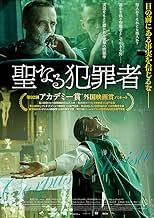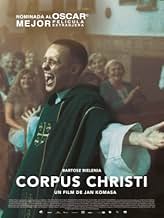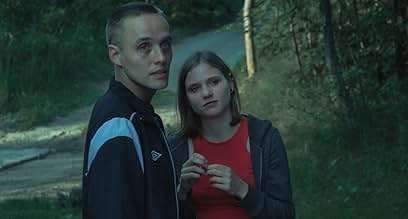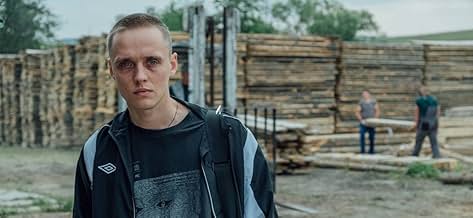IMDb-BEWERTUNG
7,7/10
23.155
IHRE BEWERTUNG
Daniel hat im Gefängnis ein Berufungserlebnis. Sein Verbrechen hindert ihn daran, ins Seminar einzutreten. Daniel hat jedoch nicht die Absicht, seinen Traum aufzugeben, und beschließt, eine ... Alles lesenDaniel hat im Gefängnis ein Berufungserlebnis. Sein Verbrechen hindert ihn daran, ins Seminar einzutreten. Daniel hat jedoch nicht die Absicht, seinen Traum aufzugeben, und beschließt, eine Kleinstadtgemeinde zu leiten.Daniel hat im Gefängnis ein Berufungserlebnis. Sein Verbrechen hindert ihn daran, ins Seminar einzutreten. Daniel hat jedoch nicht die Absicht, seinen Traum aufzugeben, und beschließt, eine Kleinstadtgemeinde zu leiten.
- Regie
- Drehbuch
- Hauptbesetzung
- Für 1 Oscar nominiert
- 56 Gewinne & 39 Nominierungen insgesamt
Lidia Bogaczówna
- Mother
- (as Lidia Bogacz)
Empfohlene Bewertungen
I saw this movie as part of the PSIFF. There were 2 movie houses packed for this performance. The story is detailed in the preview. I felt that the writing, and the performances made it one of the best films in the festival. At the end of the screening the audience were clearly awestruck. The message about the real reason for believe, not in a religion, but the power of people was uplifting. I know that some might find the story anti-Catholic, but if I met someone that was a committed to being a good person as Daniel I would be at his services.
A simple plot summary (Juvenile delinquent poses as priest, transforms village) does not begin to describe the nuanced and complex moral dilemma explored in "Corpus Christi," Poland's 2019 entry into the Oscar race. Violence, nudity, sexuality, and vulgarity--that in another film might seem gratuitous--here remind us that the world is full of angry people whose religiosity is more rooted in revenge than redemption. The central question: Is the road to love, forgiveness, and salvation more navigable when mapped by a man who wills himself into the priesthood and defies blind obedience than it is when directed by soulless compliance? Prepare yourself for a shocking and perplexing answer. Extraordinary performances, direction, and cinematography.
Always disturbing but also worrying and even intermittently amusing, this drama unfurls a religious parabola that is distinctly Polish but open to everyone. Bartosz Bielenia, an actor with blazing blue eyes and the ability to be so still, it's as if he can freeze the frame on his own, stars like Daniel, a young ne'er from Warsaw who is in juvenile detention for crimes only later revealed. He was first seen watching the gate as some teenagers in a metalwork class brutalize a boy while the guard is out, but sheer luck opens another door for him. Drawn to religion but not allowed to join a seminary due to his criminal record, he travels to a rural town once he has been paroled in a sawmill to take up work. A little gray lie allows him to take the identity of the young new priest, Tomasz, that the city expects, and soon Daniel will perform mass and hear confessions, while the old resident curate will drip out in rehabilitation for a while. Around this midpoint, the movie risks sounding like an episode of Father Ted as directed by Robert Bresson, as Daniel / Tomasz gets used to being looked after by bossy matron Lidia (Aleksandra Konieczna) in luxurious new digs and gets to know the city folk. The plot takes an interesting turn when Daniel learns that the family has been traumatized by a horrific road accident and discovers an uncommon pastoral ability when he tries to help restore the battered psyches of the bereaved-many of them barely younger than himself, including the pretty teenage daughter of Lidia, Eliza (Eliza Rycembel). All the above may lead you to expect some sort of soppy redemptive course, but that's not where this film ends up, landing on a much darker, reflective note instead. The blue-tone cinematography of Piotr Sobocinski enhances the rapturous atmosphere and enhances suspense in a smartly written, disturbing job.
... that's for sure, but some are more forgiven for their immoralities than others, regardless of their affect and intent. Many stones thrown in this intense and emotional story of deceit from Poland that will exercise your own moral compass on the actions of the unrighteous.
"You know what we're good at? Giving up on people. Pointing the finger at them. 'Forgive' doesn't mean 'forget.' It doesn't mean 'pretend nothing happened.' 'Forgive' means 'love.' Love someone despite their guilt. No matter what the guilt is."
Engaging from beginning to end, with a deeply soulful performance from Bartosz Bielenia, the young man who stumbles into impersonating a priest after getting out of juvenile detention. His character brings pragmatic, meaningful spirituality to the town, and tries to help it heal from a tragedy that not only left seven dead, but a woman ostracized. I loved the theme of forgiveness and how hard it is to truly reach this state emotionally, and how it applied to both this poor woman and the imitation priest, who were both in desperate need of it.
The film toes the line between showing religion as a positive influence - making people better individuals and a source of great comfort - and getting a few criticisms in, such as mentioning that it was just a pope along the way who thought celibacy would be a good idea, and "now it's a problem." Mostly though, it shows the power of spirituality to lift people above their baser instincts, and the best moments are those when the young priest wields this power. The scene where he leads a funeral procession down the road and we see the rich mayor washing his car is one of many of this type, and it's stirring.
As much as I liked Eliza Rycembel's performance as a young woman searching for answers in the wake of her brother's death, I wish there hadn't been a growing love between her and the young priest. The film is not without flaws but none of them are too glaring, and director Jan Komasa tells the story well, keeping it engaging from beginning to end. It's solid and one that I'd recommend.
Engaging from beginning to end, with a deeply soulful performance from Bartosz Bielenia, the young man who stumbles into impersonating a priest after getting out of juvenile detention. His character brings pragmatic, meaningful spirituality to the town, and tries to help it heal from a tragedy that not only left seven dead, but a woman ostracized. I loved the theme of forgiveness and how hard it is to truly reach this state emotionally, and how it applied to both this poor woman and the imitation priest, who were both in desperate need of it.
The film toes the line between showing religion as a positive influence - making people better individuals and a source of great comfort - and getting a few criticisms in, such as mentioning that it was just a pope along the way who thought celibacy would be a good idea, and "now it's a problem." Mostly though, it shows the power of spirituality to lift people above their baser instincts, and the best moments are those when the young priest wields this power. The scene where he leads a funeral procession down the road and we see the rich mayor washing his car is one of many of this type, and it's stirring.
As much as I liked Eliza Rycembel's performance as a young woman searching for answers in the wake of her brother's death, I wish there hadn't been a growing love between her and the young priest. The film is not without flaws but none of them are too glaring, and director Jan Komasa tells the story well, keeping it engaging from beginning to end. It's solid and one that I'd recommend.
Wusstest du schon
- WissenswertesA fictional story but based on a book exploring the surprisingly common multiple stories of clerical impostors in Poland, a phenomenon more prevalent than even the film-makers themselves expected. Most of Corpus Christi was shot in a remote village in the Carpathian foothills, where the crew soon began to feel that locals were a little cagey when the film's topic was broached. It was only when the shoot was over that they discovered that the village had its very own real history of a bogus priest. The impersonator had gotten away with it for two years before being rumbled.
- VerbindungenFeatured in The Oscars (2020)
Top-Auswahl
Melde dich zum Bewerten an und greife auf die Watchlist für personalisierte Empfehlungen zu.
- How long is Corpus Christi?Powered by Alexa
Details
- Erscheinungsdatum
- Herkunftsländer
- Offizielle Standorte
- Sprache
- Auch bekannt als
- Тіло Христове
- Drehorte
- Produktionsfirmen
- Weitere beteiligte Unternehmen bei IMDbPro anzeigen
Box Office
- Bruttoertrag in den USA und Kanada
- 127.240 $
- Eröffnungswochenende in den USA und in Kanada
- 4.632 $
- 16. Feb. 2020
- Weltweiter Bruttoertrag
- 9.943.901 $
- Laufzeit1 Stunde 55 Minuten
- Farbe
- Sound-Mix
- Seitenverhältnis
- 2.39 : 1
Zu dieser Seite beitragen
Bearbeitung vorschlagen oder fehlenden Inhalt hinzufügen


![Trailer [OV] ansehen](https://m.media-amazon.com/images/M/MV5BNjE0ZDQ4MDMtOWQzMy00NTUzLWExNzYtOWJlNGExNjBlYzAxXkEyXkFqcGdeQXRyYW5zY29kZS13b3JrZmxvdw@@._V1_QL75_UX500_CR0)
















